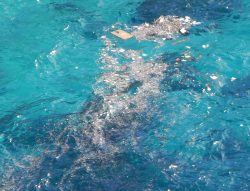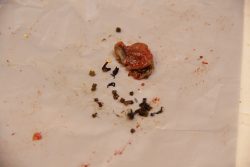The 8th of June is an important date for any marine-minded person. People around the world will be taking part in events to celebrate our oceans as a part of World Oceans Day. Those seemingly endless expanses of blue may seem far removed from our daily lives on land, but life as we know it depends on a healthy and thriving marine environment. It is therefore up to each one of us to help protect this most valuable of resources, not only for our future generations but also for the hundreds of thousands of marine species that inhabit the world’s oceans.
Our oceans perform a huge variety of complex and vital roles that makes life possible on Earth. These services go far beyond providing us with fish to eat. Microscopic phytoplankton produce over half of all oxygen in the Earth’s atmosphere. The oceans have absorbed almost half of all CO2 produced my humans in the last 200 years. Our weather and climate are governed by ocean currents distributing heat around the globe. Such powerful capabilities can make our oceans appear impervious to the activities of humans; however, researchers have reported serious long-term declines in the health of our marine environment, many of which are directly attributable to human activities. Climate change and overfishing have made headlines in the past but perhaps the most visible threat facing our oceans is the scourge of plastic pollution. Mass-produced and affordable plastic has existed for less than 70 years and yet it is now found in every corner of the planet, including previously unimaginable places like the bottom of the Marinara Trench. Every single piece of plastic that has been produced is still in existence, unless it has been burnt or broken down for re-use. It is expected that plastics will become prevalent in the fossil records of the future.
The Mediterranean Sea is no exception, if anything it is far more susceptible to plastic pollution than many other seas. Intensive shipping, fisheries, and large populations living on its many coastlines coupled with its small size make the Mediterranean a front line in our fight against marine plastic pollution.
Eight million tons of plastic enter our oceans each year and much of this plastic breaks down into tiny micro-plastics – fragments smaller than 5mm. The current estimate for micro-plastic fragments suspended in oceans is five trillion but new data is showing this to be a severe under estimation. Micro-plastics pose a serious threat to our marine life from the smallest of plankton to the largest of whales. Marine animals mistake the brightly coloured micro-plastics as food and so ingest them. Once plastic is inside an organism it is almost impossible for the animal to remove. Micro-plastics accumulate up the food chain, meaning the higher you are up the ladder, the more plastic you are likely to have inside you. As apex predators of the marine environment, seabirds are particularly susceptible to the dangers of micro-plastic pollution. Ingested plastic can have a suite of negative effects, including; internal injuries, toxicity, and blocking the digestive tract which leads to a long and painful death through starvation. This problem is particularly important for seabirds that regurgitate their food for their chicks, such as albatross and shearwaters whose chicks have been found dead in the nest with stomachs full of plastic.
Although the data for Maltese seabirds is lacking, one study (Codina – García et al. 2013) in the Mediterranean has shown three endemic and threatened Mediterranean Shearwater species as being particularly vulnerable to micro-plastic accumulation, with 94% of Cory’s Shearwaters, 70% of Yelkouan Shearwaters tested shown to have plastics within their digestive tracts. These results suggest that the Scopoli’s Shearwaters and Yelkouan Shearwaters that breed around the Maltese islands are likely to be affected by plastic pollution. We are yet to quantify the impacts that this may have on Maltese Shearwaters but it poses yet another threat to an already threatened species.
It is easy to help. Reduce your plastic waste, say no to single use “disposable” plastics, re-use plastic items, dispose of your plastic waste responsibly – put it in a bin with a lid, or even better a recycling bin. It is time that we started treating plastic with more respect. #STOPtheplastictide
By James Crymble, LIFE Arċipelagu Garnija Project Warden


